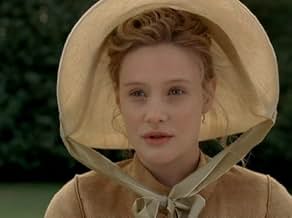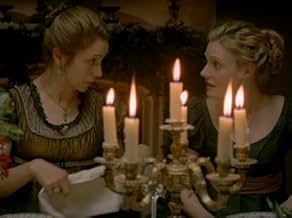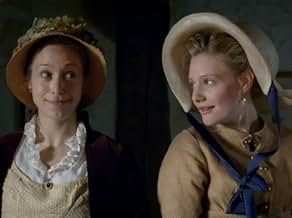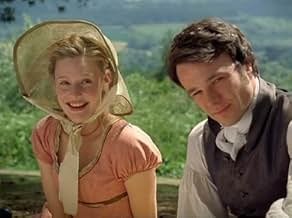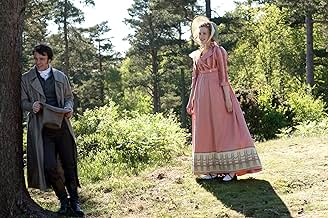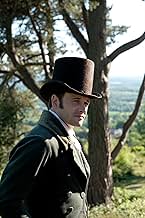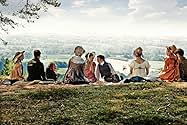Emma Woodhouse is a wealthy young woman living in the early 19th century, whose misplaced confidence in her matchmaking abilities occasions several romantic misadventures, which leads her in... Read allEmma Woodhouse is a wealthy young woman living in the early 19th century, whose misplaced confidence in her matchmaking abilities occasions several romantic misadventures, which leads her into deeper meanings of love and life.Emma Woodhouse is a wealthy young woman living in the early 19th century, whose misplaced confidence in her matchmaking abilities occasions several romantic misadventures, which leads her into deeper meanings of love and life.
- Won 1 Primetime Emmy
- 1 win & 9 nominations total
Browse episodes
Featured reviews
With the enduring interest in the novels of Jane Austen, an author eons ahead of her time as far as writing stories that dealt with women's view of the world, it is not unexpected that the film makers repeat versions of these rollicking tales. This may be the fourth or so version of EMMA and for this viewer it is the most successful. A large part of the success of this version of the novel is both the screenplay by Sandy Welch and the direction by Jim O'Hanlon who elect to open the graphic gates of Highbury with a sequence that shares with the audience the background of the diaspora of the children whose parents have died and whose lives will eventually come together as adults. It works very well in setting the scene and the mood of class distinction so prevalent in England of the period.
Emma is brought fully to life by Romola Garai and this role further establishes her as one of the more important character actresses on film. The remainder of the cast is perfectly balanced, with Michael Gambon as Emma's ever needy father, Jonny Lee Miller as the perfect Mr. Knightley, Lousie Dylan as the ditsy Harriet Smith, Tamsin Grieg as the hilariously boring and mouthy Miss Bates, the striking Blake Ritson as the vicar Mr. Elton, talented Laura Pyper as Jane Fairfax, and Jodhi May as the governess turned neighbor Anne Taylor. The ensemble casting is as fine as any of the Austen transitions to the visual and the cinematography and costumes are first class.
The words may not all belong to Jane Austen (Sandy Welch has introduced some very apropos new lines), but the feel of the novel would likely please the author as much as it pleases the audience. The 4 episode BBC production comes in two CDs and the quality of production is superb. In every way, this EMMA is a joy.
Grady Harp
Emma is brought fully to life by Romola Garai and this role further establishes her as one of the more important character actresses on film. The remainder of the cast is perfectly balanced, with Michael Gambon as Emma's ever needy father, Jonny Lee Miller as the perfect Mr. Knightley, Lousie Dylan as the ditsy Harriet Smith, Tamsin Grieg as the hilariously boring and mouthy Miss Bates, the striking Blake Ritson as the vicar Mr. Elton, talented Laura Pyper as Jane Fairfax, and Jodhi May as the governess turned neighbor Anne Taylor. The ensemble casting is as fine as any of the Austen transitions to the visual and the cinematography and costumes are first class.
The words may not all belong to Jane Austen (Sandy Welch has introduced some very apropos new lines), but the feel of the novel would likely please the author as much as it pleases the audience. The 4 episode BBC production comes in two CDs and the quality of production is superb. In every way, this EMMA is a joy.
Grady Harp
Brilliant! Everything from the acting, the costumes, storyline, and music was just so superbly done. This version of Emma far surpasses its predecessors. Romola, actress staring as Emma, puts Pultrow to shame.
This movie sets itself apart from other versions of Emma. The storyline is very much dictated by the actual book. The actors and actresses really captured the characters in the story; it made all the difference in being able to identify and understand the characters.
Also, the setting and costumes they chose really captured the times. The color palate was sensational.
If you are a true Jane Austen fan, you will love this film. It is a must for your Austen collection!! WELL DONE!!
This movie sets itself apart from other versions of Emma. The storyline is very much dictated by the actual book. The actors and actresses really captured the characters in the story; it made all the difference in being able to identify and understand the characters.
Also, the setting and costumes they chose really captured the times. The color palate was sensational.
If you are a true Jane Austen fan, you will love this film. It is a must for your Austen collection!! WELL DONE!!
There is a clichéd version of Period and Regency characters which grew up in the 1920's and 1930's fostered by UK and US film studios with straight backs, ironed crinolines, stiff upper lips and emotionally strangled dialogue from which a number of recent adaptations have dared to depart.
Sometimes, as in the case of 1999 Mansfield Park, adapters and cast have departed for the hills and created something so far off Austen's wavelength that it might be a prequel for the Pirates of The Caribbean franchise. Enjoyable perhaps. But not MP.
That's not what we have here. What we have here is something that is entirely on Austen's wavelength, with characters behaving as her characters would and saying the sorts of things her characters say. Something which is faithful to the purpose and meaning of the book, which aims to get the characters Jane Austen wrote onto the screen where we can see, recognise and enjoy them. This series is triumphantly successful at doing just that, partly owing to the care that has been taken with the script and partly due to the outstanding performances of the leads.
It built on a wonderfully realistic foundation of what love, loss and family all mean. If it did, perhaps, labour the point a bit at the beginning, there were superb contrasts between where Emma's life was full and empty. Her lack of self knowledge, her yearning for companions and challenges worthy of her sense and intelligence clearly illustrated the traps she made for herself.
And whilst we follow the progression of their relationship from Knightley's point of view more than the book warrants, Emma's bursting discovery of her love for him is actually dramatised here just as Austen wrote it, not watered down by injections of artificial chemistry between the lead actors.
I think there are lots of people who could turn out an Emma adaptation like the two films from the 90's. This version set itself the much harder task of adapting the book (as Clueless did) rather than just animating selected bits and stringing them together. And it succeeds. The reason Garai's Emma is different to all the others is that Garai is playing the character Jane Austen wrote and Sandy Welch, as she did with Jane Eyre, got her onto the screen by dramatically recreating her rather than transposing her dialogue into a screenplay.
There are, of course, unnecessary departures from the canon. Perhaps it is highly unlikely that Emma would have allowed Knightley to kiss her within sight of the house, or that Knightley would have forgotten himself that far either. However, were they sure of being unobserved, I think Emma and Frank would have been perfectly capable of shocking even modern dowagers with a passion that is written carefully into the novel but seldom gets up onto the screen. If I was servant at Hartfield, I'd be very careful to make them aware of my presence outside the bedroom door before taking their morning tea in.
I had my reservations about this adaptation at first but having watched it more times than I now care to admit, I cannot now name a better Austen adaptation. I think the unusual start was a gamble designed to illustrate the insecurity of early 19C family life to newcomers and wilfully detach dedicated Austen fans from their comfort zone from the opening seconds, both of which worked triumphantly. It instantly drew parallels between the lives of Emma, Jane and Frank (and, more subtly, Harriet) which are at the core of the book and completely absent from any other adaptation. A very, very clever trick for which some purists have yet to forgive her. Not this one, however. Once you have adjusted your goggles, this adaptation hits new heights for the whole genre and becomes an unalloyed pleasure.
It's beautifully shot, all the characterisations are incredibly detailed, even minor characters like John Knightley and Mrs Goddard are fully realised and Garai and Miller hit their top notes reliably again and again.
I'm sure Austen would love it.
Sometimes, as in the case of 1999 Mansfield Park, adapters and cast have departed for the hills and created something so far off Austen's wavelength that it might be a prequel for the Pirates of The Caribbean franchise. Enjoyable perhaps. But not MP.
That's not what we have here. What we have here is something that is entirely on Austen's wavelength, with characters behaving as her characters would and saying the sorts of things her characters say. Something which is faithful to the purpose and meaning of the book, which aims to get the characters Jane Austen wrote onto the screen where we can see, recognise and enjoy them. This series is triumphantly successful at doing just that, partly owing to the care that has been taken with the script and partly due to the outstanding performances of the leads.
It built on a wonderfully realistic foundation of what love, loss and family all mean. If it did, perhaps, labour the point a bit at the beginning, there were superb contrasts between where Emma's life was full and empty. Her lack of self knowledge, her yearning for companions and challenges worthy of her sense and intelligence clearly illustrated the traps she made for herself.
And whilst we follow the progression of their relationship from Knightley's point of view more than the book warrants, Emma's bursting discovery of her love for him is actually dramatised here just as Austen wrote it, not watered down by injections of artificial chemistry between the lead actors.
I think there are lots of people who could turn out an Emma adaptation like the two films from the 90's. This version set itself the much harder task of adapting the book (as Clueless did) rather than just animating selected bits and stringing them together. And it succeeds. The reason Garai's Emma is different to all the others is that Garai is playing the character Jane Austen wrote and Sandy Welch, as she did with Jane Eyre, got her onto the screen by dramatically recreating her rather than transposing her dialogue into a screenplay.
There are, of course, unnecessary departures from the canon. Perhaps it is highly unlikely that Emma would have allowed Knightley to kiss her within sight of the house, or that Knightley would have forgotten himself that far either. However, were they sure of being unobserved, I think Emma and Frank would have been perfectly capable of shocking even modern dowagers with a passion that is written carefully into the novel but seldom gets up onto the screen. If I was servant at Hartfield, I'd be very careful to make them aware of my presence outside the bedroom door before taking their morning tea in.
I had my reservations about this adaptation at first but having watched it more times than I now care to admit, I cannot now name a better Austen adaptation. I think the unusual start was a gamble designed to illustrate the insecurity of early 19C family life to newcomers and wilfully detach dedicated Austen fans from their comfort zone from the opening seconds, both of which worked triumphantly. It instantly drew parallels between the lives of Emma, Jane and Frank (and, more subtly, Harriet) which are at the core of the book and completely absent from any other adaptation. A very, very clever trick for which some purists have yet to forgive her. Not this one, however. Once you have adjusted your goggles, this adaptation hits new heights for the whole genre and becomes an unalloyed pleasure.
It's beautifully shot, all the characterisations are incredibly detailed, even minor characters like John Knightley and Mrs Goddard are fully realised and Garai and Miller hit their top notes reliably again and again.
I'm sure Austen would love it.
I was surprised to see the new Emma. It's back to the way Jane Austen wrote it. It's a slowly unfolding story about a not too pretty girl with character flaws. She has a temper, she gossips, she hurts peoples feelings, and she can't keep her promise to stop matchmaking. But she grows on you.
The plot is close to Austens novel. The only funny aspect comes from Gambon, although everybody's acting is good. I like it, when actors act with their eyes, in stead of rambling on about it. I think you'll notice more subtle hints if you know the story.
The first two episodes are not romantic. But then, you know Jane Austen pays a lot of attention to describing how to behave when you're a rich civilian in the country.
The plot is close to Austens novel. The only funny aspect comes from Gambon, although everybody's acting is good. I like it, when actors act with their eyes, in stead of rambling on about it. I think you'll notice more subtle hints if you know the story.
The first two episodes are not romantic. But then, you know Jane Austen pays a lot of attention to describing how to behave when you're a rich civilian in the country.
Emma was really beautiful to watch. Though I will say, and I am not trying to be a killjoy here, but the book is better. In general, this mini series was very well done, not only in terms of acting but visually and musically as well. The mini series was exquisitely photographed, with camera work that never felt rushed in any way. It perfectly captured the breathtaking scenery and the gorgeous colourful costumes. I will confess whenever I watch a period drama I always look at how the drama is filmed, and as far as I am concerned Emma scored full marks on that. The music was just as perfect, very beautiful and pleasant. And the acting was fully professional. Romola Garai looked stunning as Emma and managed to stay true to her character. Johnny Lee Miller may look a bit too young, but I do think he was very handsome and charismatic enough as Knightley, and in general Miller is a very competent actor. The two leads's chemistry was convincing too. Michael Gambon is an exceptional actor, and he was superb as Mr Woodhouse. For me, any scene he was in brought some depth, darkness and poignancy that was very much needed. In fact, I don't think there was a single bad performance, maybe not the definitive interpretations, but solid enough. I do have two flaws with this mini series. It does distort the book, and I did notice some modernisations in the script, that sounded uneven and didn't quite work. My other flaw is that there were scenes that didn't quite ring true. As one reviewer said, the scene with the Knightley children screaming Uncle George was poorly done, and that is a real shame because the scene before I thought was very impressive indeed. Despite the flaws, it is a very solid adaptation of a wonderful book. 9/10 Bethany Cox
Did you know
- TriviaIn 1995, BBC had already commissioned Sandy Welch to write the script for an "Emma" mini-series. However, since Miramax and also Meridien were producing their own movies for cinema and television, respectively, the BBC canceled its own project. One decade later, the production was revived.
- ConnectionsFeatured in The 62nd Primetime Emmy Awards (2010)
- How many seasons does Emma have?Powered by Alexa
Details
- Release date
- Country of origin
- Official sites
- Language
- Also known as
- 艾瑪
- Filming locations
- Loseley Park, Guildford, Surrey, England, UK(Donwell Abbey, Mr Knightley's estate)
- Production company
- See more company credits at IMDbPro
Contribute to this page
Suggest an edit or add missing content





